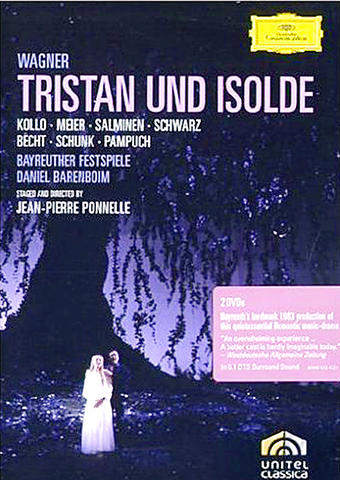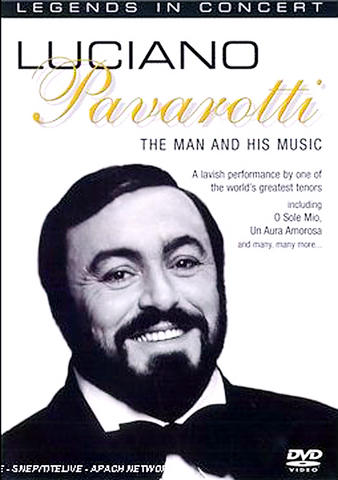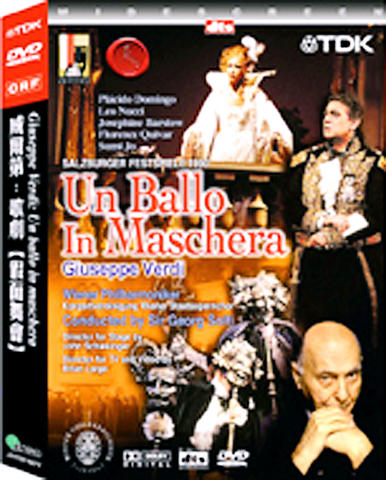Wagner's Tristan und Isolde has long lacked a first-class DVD version. The Metropolitan Opera's offering with Ben Heppner and Jane Eaglen and an abstract staging by Dieter Dorn [reviewed Taipei Times Feb. 1, 2004] pleased few, and the old 1973 set with John Vickers and Birgit Nilsson apparently has poor image and sound quality. The strongest rendering up to now was probably from the National Theater Munich, with Waltraud Meier as Isolde and directed (in highly original fashion) by Peter Konwitschny. But a famous Bayreuth version directed by Jean-Pierre Ponnelle dating from 1983 has just appeared on DVD from Deutsche Grammophon. So, how do these two seeming front-runners compare?
Ponnelle's Tristan opens wonderfully with a gray sea covered by drifting mist, and this continues for most of the Prelude. This focuses the imagination on the mythic nature of the subject matter and stills distracting thoughts in preparation for the long haul ahead. But it's Act Three that's most impressive, with Tristan, Kurwenal and the Shepherd looking like World War I soldiers stranded, unshaven and delirious, in no man's land. The last half hour is treated as a fantasy in the mind of the fevered hero. This, in other words, is a largely traditional Tristan, but with dream-like elements added.
Rene Kollo makes a predictably fine Tristan, and Matti Salminen is, as you'd expect, overwhelming as King Marke. Hermann Becht and Hanna Schwarz are excellent as Kurwenal and Brangane respectively. Johanna Meier (Isolde), someone who never managed to become internationally famous, is persuasive enough, though the Liebestod proves beyond her. Daniel Barenboim conducts the Bayreuth Festival Orchestra with appropriate intensity.

The Munich Tristan is very different. In the first act, in place of gloom and foreboding we have light. It's set on board a luxury liner, complete with sun-chairs and cocktails, and the chorus of sailors looks mockingly in on the drugged lovers through a porthole. Act Two is more conventional - until, that is, Tristan lugs on a cheap yellow sofa for the couple to sit and sing on (they're supposed to be in the middle of a forest). Act Three starts with Tristan watching a slide-show, followed by some really zany stage inventions when Marke and Brangane arrive.
I don't usually like these tradition-challenging productions, but this one proved an exception. I put this down to the enormous persuasiveness of Waltraud Meier as an erotic, indeed sex-crazed, Isolde. The reason this works is that she's one of the world's most effective dramatic sopranos as well. Jon Frederick West is a highly masculine Tristan - not in her league vocally, perhaps, but powerful enough through headphones on a DVD. Kurt Moll is very moving as Marke, and Marjana Lipovsek is also strong as Brangane. Zubin Mehta conducts the Bayerische Staatsorchester with notable discernment, and the sound quality is very fine, with orchestral detail easily heard throughout.
The choice, then, depends on your priorities. On balance I'd opt for the Ponnelle/ Barenboim version, though the Isolde on the Konwitschny/ Mehta DVD is undoubtedly superior, and I'd like to have their Act One to watch when I felt in need of some visual stimulation.

T aiwan's Jingo has come up trumps with an absolutely superb rendering of Verdi's Un Ballo in Maschera (A Masked Ball) in a vivid production from the 1990 Salzburg Festival by UK film director John Schlesinger (Midnight Cowboy). It stars Placido Domingo, Leo Nucci, Josephine Barstow and Florence Quivar, with the South Korean soprano Sumi Jo as Oscar. Schlesinger created the production the previous year under Karajan, but following Karajan's death Gorg Solti took over for its first revival, seen here. (Commenting on the premier, Schlesinger remarked that the festival audience could barely raise their hands to applaud for the weight of the jewelry).
On this DVD, Solti urges the Vienna Philharmonic into a searing account of Verdi's dramatic score, and I've rarely heard instrumental color as richly reproduced. Verdi's natural grandeur is matched by the grandeur of the sets and costumes, and with the work's original Swedish setting restored, this Ballo is magnificent on all fronts.
All the soloists were then at their peak, including Josephine Barstow, whose powerful acting matches her devastating singing. The central scenes, from the arrival of Amelia in the graveyard to the drawing of lots as to who should kill Gustavo, are incomparably fine, with passionate commitment all round. Domingo manages Gustavo's death (from two ear-splitting pistol shots) superbly, and it's also wonderfully filmed. Opera doesn't come much more impressive than this.

F ollowing the death of Pavarotti, Well Go USA in Taiwan is promoting a DVD of a concert he gave at the Grand Teatro del Liceo in Barcelona in 1988. The program is nearly identical to the one he performed the same year at New York's Metropolitan Opera, with James Levine at the keyboard [Decca DVD 074 307-1 2HD].
Well Go's DVD contains an interview with Pavarotti and it's impressive to hear him speaking in fluent Spanish. But it isn't only affection for Levine that makes me prefer the New York concert to this one. The former has far and away the more inspirational feel, and Levine's self-effacing piano playing is nothing less than exquisite.


May 18 to May 24 Pastor Yang Hsu’s (楊煦) congregation was shocked upon seeing the land he chose to build his orphanage. It was surrounded by mountains on three sides, and the only way to access it was to cross a river by foot. The soil was poor due to runoff, and large rocks strewn across the plot prevented much from growing. In addition, there was no running water or electricity. But it was all Yang could afford. He and his Indigenous Atayal wife Lin Feng-ying (林鳳英) had already been caring for 24 orphans in their home, and they were in

On May 2, Chinese Nationalist Party (KMT) Chairman Eric Chu (朱立倫), at a meeting in support of Taipei city councilors at party headquarters, compared President William Lai (賴清德) to Hitler. Chu claimed that unlike any other democracy worldwide in history, no other leader was rooting out opposing parties like Lai and the Democratic Progressive Party (DPP). That his statements are wildly inaccurate was not the point. It was a rallying cry, not a history lesson. This was intentional to provoke the international diplomatic community into a response, which was promptly provided. Both the German and Israeli offices issued statements on Facebook

Even by the standards of Ukraine’s International Legion, which comprises volunteers from over 55 countries, Han has an unusual backstory. Born in Taichung, he grew up in Costa Rica — then one of Taiwan’s diplomatic allies — where a relative worked for the embassy. After attending an American international high school in San Jose, Costa Rica’s capital, Han — who prefers to use only his given name for OPSEC (operations security) reasons — moved to the US in his teens. He attended Penn State University before returning to Taiwan to work in the semiconductor industry in Kaohsiung, where he

President William Lai (賴清德) yesterday delivered an address marking the first anniversary of his presidency. In the speech, Lai affirmed Taiwan’s global role in technology, trade and security. He announced economic and national security initiatives, and emphasized democratic values and cross-party cooperation. The following is the full text of his speech: Yesterday, outside of Beida Elementary School in New Taipei City’s Sanxia District (三峽), there was a major traffic accident that, sadly, claimed several lives and resulted in multiple injuries. The Executive Yuan immediately formed a task force, and last night I personally visited the victims in hospital. Central government agencies and the